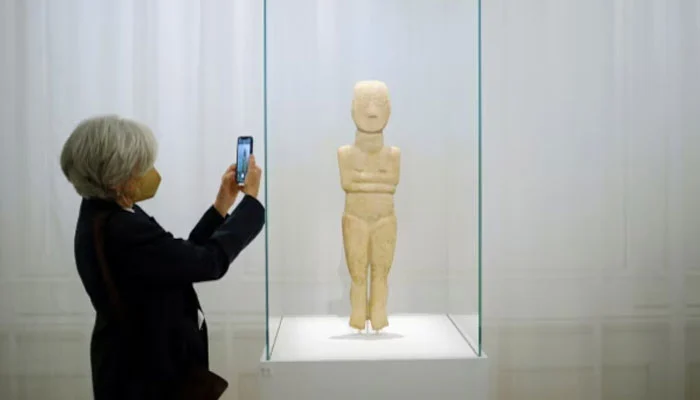In a significant triumph, Greece has successfully recovered hundreds of stolen artifacts, including a notable 2nd-Century bronze statue depicting Alexander the Great. This achievement marks a crucial milestone in Greece’s ongoing efforts to combat the illegal trade of cultural heritage.
The recovery comes after a prolonged legal dispute with a company associated with British antiquities dealer Robin Symes, known for his involvement in an illicit network of traders. Greece’s determination to reclaim looted treasures from museums and private collections worldwide is evident in this recent success.
Greek Culture Minister Lina Mendoni proudly announced the return of 351 objects from Symes’s collection after a 17-year legal battle. This development underscores Greece’s commitment to preserving and protecting its rich cultural heritage. While it was not explicitly stated whether these artifacts were linked to the 2016 discovery of Symes’s archaeological treasures stored in the Geneva Freeport, their repatriation signifies a significant victory for Greece and its cultural preservation efforts.
Among the prominent contested artworks are the Parthenon Sculptures, which were originally removed from the Parthenon temple in Athens during the early 19th Century by Lord Elgin, a British soldier, and diplomat. These sculptures were later acquired by the British government and are currently housed in the British Museum. Ongoing discussions regarding their return to Greece are reportedly making progress. The repatriation of these highly prized sculptures would be a tremendous milestone for Greece and its campaign to reclaim its cultural treasures.
Greece’s recent accomplishment contributes to the growing global momentum in the battle against the illegal trade of cultural artifacts. The return of these stolen treasures not only safeguards Greece’s rich heritage but also emphasizes the importance of international collaboration in combating the illegal art market. In March, the Vatican also made a significant gesture by returning three fragments from Athens’ Parthenon temple, which it had held for centuries. These acts of repatriation demonstrate a growing recognition of the significance of cultural restitution and the need to rectify historical injustices.
As countries worldwide increasingly prioritize the protection of their cultural treasures, efforts to combat illicit trade and secure the return of stolen artifacts gain traction. The recovery of these looted objects serves as a powerful reminder of the ongoing battle and highlights the significance of preserving cultural heritage for future generations. The fight against the illegal trade of cultural heritage continues, bolstered by Greece’s recent victory and the collective determination to safeguard the world’s cultural treasures.




